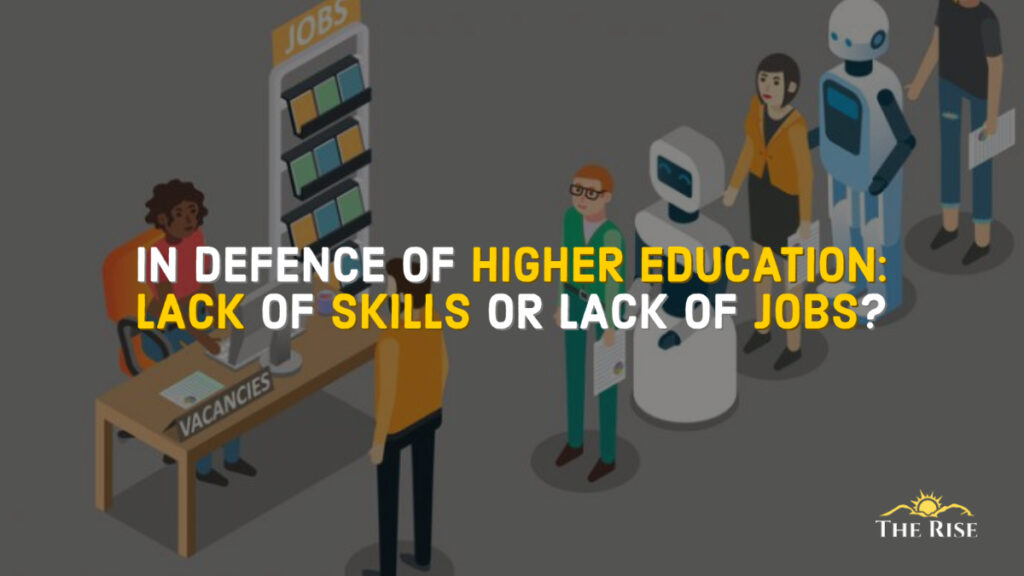Higher education can, indeed, be censured for expanding rather too rapidly, but it was in response to the call of the industry and to alley their apprehension that the country shall not have enough graduates to match their requirements to sustain their growth momentum. However, the industry has neither been turning up jobs commensurate to their growth nor has been offering better service conditions and income opportunities to an overwhelmingly large proportion of their employees hired on a limited number of jobs that they put on offer.
Universities are often berated for under-performing and producing graduates that are neither employed nor employable. Findings of occasional surveys, often lacking a systematic and scientific approach to research designs, are cited to suggest that a predominant proportion of the graduates lack knowledge because universities do not update their syllabi and pedagogy periodically, and teachers do not update themselves to the contemporary needs of the industry. It is also claimed that the students lack skills to apply their knowledge for solving real-life problems because they are seldom exposed to hands-on training, and the academics and the students lack the aptitude to work for and with the industry. Lately, instances of a large number of graduates, postgraduates, and doctoral degree holders applying for jobs requiring just school level qualifications have been quoted to lend further credence to prove that degrees awarded by the higher educational institutions are not even worth a dime.
An objective assessment of the situation, however, tells an altogether different story. There is no denying the fact that some graduates may fail to get jobs commensurate to their qualifications due to deficiencies in their knowledge, skills, aptitudes, values, and work ethics. But at the same time, most fail to get jobs worth their qualification because such jobs are simply not available, earlier because of the jobless growth and now due to economic slowdown.
Since Independence, the number of higher educational institutions in the country has been growing by leaps and bounds to become the single largest system of higher education found anywhere in the world. At the same time, they have not been able to keep pace with their growth as far as their physical facilities, teaching-learning infrastructure, and human resources are concerned. These are evident from the continuously deteriorating student-teacher ratio (STR) and a large number of faculty and non-faculty positions. With 38.5 million students on their roll, higher educational institutions are presently churning out in excess of 10 million graduates every year. Admittedly, they do suffer from learning deficiencies because they did not have a conducive teaching-learning environment due to a lack of infrastructure and human resources. Holding higher educational institutions responsible for such a situation would be tantamount to punishing Peter for the faults committed by Paul.
Also Read: Excess Impedes Excellence: Empirical Evidence for Regulation in Higher Education
Universities may have to share a part of the blame for failing to reform their curricula and the teaching-learning methodology befitting the requirements of the industry. But, it must be realized, that this is largely due to the lack of an adequate number of suitably qualified faculty and other resources, the blame for which lies elsewhere. Lately, there have been serious compromises in the selection of faculty members. In most institutions, teachers are generally engaged on a contractual/ part-time basis as guest faculty and, perhaps with a gap of a decade or so, they may be regularised. Obviously, in the process, higher educational institutions are deprived of the best of the talents as they move on to get better and more secure jobs. Interestingly, higher education institutions report only a fraction of the contractual and guest faculty in the All India Survey of Higher Education (AISHE). Those in the higher education system, however, know it well that most of the private higher educational institutions hire faculty on a contractual basis on a negotiated salary. In the public higher educational institutions, about 20 to 30 percent of the faculty are on a guest faculty basis, with an hourly basis of pay having some ceiling for the maximum.
The industry has neither been turning up jobs commensurate to their growth nor has been offering better service conditions and income opportunities to an overwhelmingly large proportion of their employees hired on a limited number of jobs that they put on offer.
Also Read: Quality Education: A Luxury or A Fundamental Right?
Besides, a good majority of the graduates fail to find jobs and get the income opportunities that their degrees behove, simply because as many jobs are not being created in the country. This has, obviously, led to a number of asymmetries and distortions in the job markets. Public sector jobs with better income, assured career progression, decent working conditions and job securities have been dwindling for twin reasons. The number of sanctioned positions has remained frozen over time, and a large number of vacancies remain unfilled despite repeated advertisements, tests, and interviews. Secondly, the governments and the public sectors undertaking and enterprises have increasingly been resorting to hiring human resources on outsourcing or contractual basis, which offer low to very-low compensation, compelling them to work for longer hours, and often downloading on them the work that the full-timer regular one ought to be doing. The outsourced staff agrees to such demands because of their vulnerabilities. The phenomenon has now been given a high-sounding name of ‘Flexi workforce’. Such practices may cut costs, save resources and manage deficits, but, at the same time, deprive youth with higher qualifications from contributing to the development and growth of the economy.
The case of the private sector has been no better. The industry has neither been turning up jobs commensurate to their growth nor has been offering better service conditions and income opportunities to an overwhelmingly large proportion of their employees hired on a limited number of jobs that they put on offer, even though the managerial compensations as a percentage of their profits and turnover have been steadily rising. Clearly, a small proportion of their workforce gets high to very-high salaries while a vast majority of their employees survive on subsistence wages and work compensation. It is, therefore, no surprise to see a mad rush of youth with much higher qualifications applying for the post of drivers, peons cleaning staff, etc in the government and public sector. Though menial, and lacking high sounding designation of ‘executive’, they still offer higher salaries, better work conditions, and job security. After all, people would, at the end of the day, prefer to be a prosperous peon rather than being a pauper professor in a higher educational institute or a work-laden impoverished executive.
You May Like: Gurus Being Outsourced in ‘Vishwaguru’ India
A good number of university graduates who have gone abroad for higher studies are generally rated by their professors as competent, committed, and hardworking with a passion to perform.
It is proven by the fact that many of the graduates failing to find a suitable career opportunity leave their motherland for other shores, and get a quality job and provide themselves worth their academic accomplishments. Once abroad, they not only succeed in getting access to quality higher education or jobs, but also end up performing quite well, invariably excelling in their chosen field, and earning accolades. A good number of university graduates who have gone abroad for higher studies are generally rated by their professors as competent, committed, and hardworking with a passion to perform. So is the case with a large number of Indians with university degrees from India who have gone abroad in search of jobs. They not only succeed in their efforts but are also generally regarded well for their achievements and accomplishments.
Speaking domestically, can we ignore the fact that the world’s sixth-largest economy worth $2.8 trillion (in fact, the third largest with $10.38 trillion, in purchasing power parity (PPP) terms) that India has come to become, has been sustained solely on the strength of human resources educated and trained in India. The message is loud and clear; give the graduates the first break, an opportunity to progress, and a reasonable work environment and they would prove themselves up to the mark.
Also Read: Blended Learning in Indian Higher Education: How Feasible is it?
Higher education can, indeed, be censured for expanding rather too rapidly, but it was in response to the call of the industry and to alley their apprehension that the country shall not have enough graduates to match their requirements to sustain their growth momentum. Industry’s argument to allow private players in higher education to share the burden of the government was also heeded, with the result that they are now a dominant player. Skill gaps have also been addressed through skill-development initiatives which have largely been guided and led by the industry. If the jobs are still not in the offing for the graduates, it is because enough jobs are not being created to match the growth in higher education, and that the higher education lacks a conducive ecosystem.
Disclaimer: The views expressed in this article are of the author solely. TheRise.co.in neither endorses nor is responsible for them.
About the author
Dr. Furqan Qamar is a former professor of management at Jamia Millia Islamia and an education advisor in the Planning Commission, now NITI Aayog, is currently the Chief Advisor to the Chancellor at Integral University, Lucknow. He has been the former Vice-Chancellor of the University of Rajasthan and Central University of Himachal Pradesh and Secretary General of Association of Indian Universities..








































Pingback: In Defence of Higher Education – Furqan Qamar
While you have summed up well : job creation by private sector & condusive ecosystem in higher education, however we can’t ignore the facts that jobs will keep going down because of technological advancement- repeated jobs will be taken over by AI, Robots / bots, changes taking place fast due to cut throat competition forcing private sector to go for more & more automation process. We need to overhaul existing education ecosystem at the lightening speed ( let us not lose time just by deliberating NEP 20) making it compitable with ever changing requirements of private as well public sector( public sector is also moving fast in automating it’s processes thereby eliminating many jobs found redundant).
Thanks Mateen saheb for your valued comments representing the industry perspective.
Pingback: Self-Financed Private Universities: Implications on Affordability